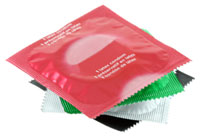Condoms Birth Control
Male Condoms
Condoms are called barrier methods of birth control because they put up a block, or barrier, which keeps the sperm from reaching the egg.
Only latex or polyurethane (because some people are allergic to latex) condoms are proven to help protect against STDs, including HIV. "Natural" or "lambskin" condoms made from animal products also are available. But lambskin condoms are not recommended for STD prevention because they have tiny pores that may allow for the passage of viruses like HIV, hepatitis B and herpes.
Male condoms are 86% to 98% effective at preventing pregnancy.
 Condoms can only be used once. You can buy them at a
drug store. Condoms come lubricated (which can make sexual intercourse more
comfortable and pleasurable) and non-lubricated (which can also be used for
oral sex). It is best to use lubrication with non-lubricated condoms if you
use them for vaginal or anal sex. You can use KY jelly or water-based
lubricants, which you can buy at a drug store. Oil-based lubricants like
massage oils, baby oil, lotions, or petroleum jelly will weaken the condom,
causing it to tear or break.
Condoms can only be used once. You can buy them at a
drug store. Condoms come lubricated (which can make sexual intercourse more
comfortable and pleasurable) and non-lubricated (which can also be used for
oral sex). It is best to use lubrication with non-lubricated condoms if you
use them for vaginal or anal sex. You can use KY jelly or water-based
lubricants, which you can buy at a drug store. Oil-based lubricants like
massage oils, baby oil, lotions, or petroleum jelly will weaken the condom,
causing it to tear or break.
Always keep condoms in a cool, dry place. If you keep them in a hot place (like a billfold, wallet, or glove compartment), the latex breaks down, causing the condom to tear or break.
Female Condoms
Worn by the woman, the female condom is a barrier method which keeps sperm from getting into her body. It is made of polyurethane, and may protect against STDs, including HIV. It can be inserted up to 8 hours prior to sexual intercourse. Female condoms are 79 to 95% effective at preventing pregnancy.

Disclaimer: All information provided in this document is for educational purposes only. It is not intended as a substitute for advice provided by a medical doctor or qualified healthcare provider. You should not use this information for self-diagnosis or for treating a health problem or disease. If you have any questions whatsoever about your medical health or believe you have a medical problem or disease, you should contact your medical doctor or healthcare provider. You should never disregard medical advice or delay seeking medical advice or treatment because of something you have read herein. No guarantee is made about the accuracy, completeness, or relevance of the information contained herein.


